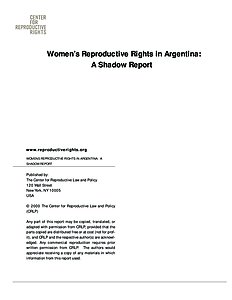Women's reproductive rights in Argentina

This document is intended to supplement, or “shadow,” the report of the government of Argentina to the Human Rights Committee (“the Committee”). As has been expressed by Committee members, non-governmental organizations (NGOs) can play an essential role in providing credible and reliable independent information regarding the legal framework and the real-life situation of reporting countries as well as the efforts made by the ratifying governments to comply with the International Covenant on Civil and Political Rights (ICCPR). Shadow reports can help the Committee focus its recommendations on the most pressing issues for the population of a given country, providing NGOs with valuable tools with which to pressure their governments to enact or implement legal and policy changes.
Discrimination against women permeates all societies and all facets of women’s lives. Clearly this discrimination requires urgent action. This report is focused particularly on laws and policies affecting reproductive rights. In a series of international conferences during the 1990s, including the 1994 International Conference on Population and Development held in Cairo and the 1995 Fourth World Conference on Women held in Beijing, the fundamental nature of reproductive rights was affirmed and further developed. This report discusses laws and public policies connected with such rights, as well as the current climate for women’s rights in Argentina.